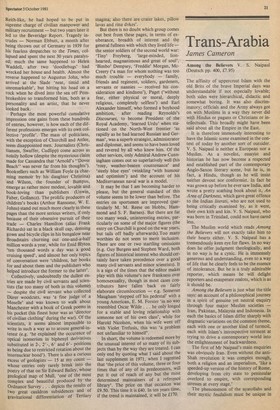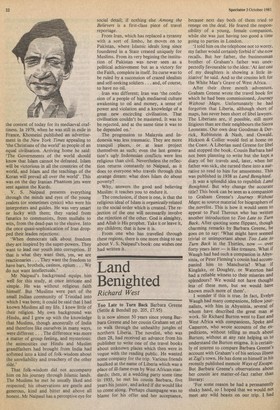Trans-Arabia
James Cameron
Among the Believers V. S. Naipaul (Deutsch pp. 400, £7.95) The affinity of uppercrust Islam with the old Brits of the brave Imperial days was understandable if not especially lovable; both sides were hierarchical, didactic and somewhat boring. It was also discriminatory; officials and the Army always got on with Muslims in a way they never did with Hindus or pagans or Christians or intellectuals. This broadly might have been said about all the Empire in the East.
It is therefore immensely interesting to have the Islamic scene examined in the context of today by another sort of outsider. V. S. Naipaul is neither a European nor a Muslim. As a novelist, essayist and historian he has now become a respected and established part of the contemporary Anglo-Saxon literary scene, but he is, in fact, a Hindu, though as he will insist neither devout nor conformist. In fact he was grown up before he ever saw India, and wrote a pretty scathing book about it, An Area of Darkness, which gave great offence to the Indian literati, who are not used to being critically examined by, as it were, their own kith and kin. V. S. Naipaul, who was born in Trinidad, could not have cared less.
The Muslim world which reads Among the Believers will not exactly take him to their hearts either. V. S. Naipaul has a tremendously keen eye for flaws. In no way does he offer judgment theologically, and in no way is he a cynic. He is immensely generous and understanding, even to a way of life that he clearly feels to be the essence of intolerance. But he is a truly admirable reporter, which means he will delight reporters and exasperate zealots, which is as it should be.
Among the Believers is just what the title says: an account of a philosophical journey in a spirit of genuine yet neutral enquiry through four major Muslim societies — Iran, Pakistan, Malaysia and Indonesia. In each the basics of Islam differ sharply with dogmatic variations on the common theme, each with one or another kind of turmoil, each with Islam's introspective torment at trying to drive a contemporary world into the enlightenment of backwardness.
The first of Mr Naipaul's main enquiries was obviously Iran. Even without the antiShah revolution it was complex enough, both a religion and an imperialism, 'like a speeded-up version of the history of Rome, developing from city state to peninsular overlord to empire, with corresponding stresses at every stage.'
The phenomenon of the ayatollahs and their mystic feudalism must be unique in the context of today for its mediaeval craftiness. In 1979, when he was still in exile in France, Khomeini published an advertisement in the New York Times appealing to 'the Christians of the world' as people of an equal civilisation. Arriving home he said: 'The Governments of the world should know that Islam cannot be defeated. Islam will be victorious in all the countries of the world, and Islam and the teachings of the Koran will prevail all over the world'. This was on the day Iranian Phantom jets were sent against the Kurds.
V. S. Naipaul presents everything through the minds and eyes of the young zealots (or sometimes cynics) who were his interpreters and guides. He was very smart or lucky with them; they varied from fanatics to communists, from mullahs to wits, from the dead-pan to the elusive. Into the once quasi-sophistication of Iran dropped their leaden rejections: 'When democrats talk about freedom they are inspired by the super-powers. They want to lead our youth into corruption. If that is what they want then, yes, we are reactionaries. . . They want the freedom to have bars, brothels, casinos, opium. . . We do not want intellectuals.'
Mr Naipaul's background equips him well for this study, at once intricate and simple. He was without religious faith himself. But 'Muslims were part of the small Indian community of Trinidad into which I was born; it could be said that I had known Muslims all my life. I knew little of their religion. My own background was Hindu, and I grew up with the knowledge that Muslims, though ancestrally of India and therefore like ourselves in many ways, were different . . . The difference was more a matter of group feeling, and mysterious: the animosities our Hindu and Muslim grandfathers had brought from India had softened into a kind of folk-wisdom about the unreliability and treachery of the other side.'
That folk-wisdom did not accompany him on his journey through Islamic lands. The Muslims he met he usually liked and respected; his observations are gentle and generous, kind and bitter and above all honest. Mr Naipaul has a perceptive eye for social detail; if nothing else Among the Believers is a first-class piece of travel reportage.
From Iran, which has replaced a tyranny with a sort of limbo, he moves on to Pakistan, where Islamic ideals long since foundered in a State created uniquely for Muslims. From its very begining the institution of Pakistan was never seen as a political achievement but as a victory for the Faith, complete in itself. Its curse was to be ruled by a succession of crazed idealists and self-seeking soldiers. . . and, of course, to have no oil.
Iran was different; Iran was 'the confusion of a people of high mediaeval culture awakening to oil and money, a sense of power and violation and a knowledge of a great new encircling civilisation. That civilisation couldn't be mastered. It was to be rejected, and at the same time it was to be depended on.'
The progression to Malaysia and Indonesia was less traumatic. They are more tranquil places, or at least project themselves as such; even the last generation's ugly Indonesian conflicts were less religious than civil. Nevertheless the reflection returns constantly to Naipaul, as it does to everyone who travels through this strange dream: what does Islam do about poverty?
Why, answers the good and believing Muslim: it teaches you to endure it.
The conclusion, if there is one, is that the religious ideal of Islam is organically related to the social order which is created. The rejection of the one will necessarily involve the rejection of the other. God is almighty, and Allah is His prophet. Take it or leave it, my children; that is how it is.
From one who has travelled through these regions, there is one more thing to say about V. S. Naipaul's book: one wishes one had written it.







































 Previous page
Previous page